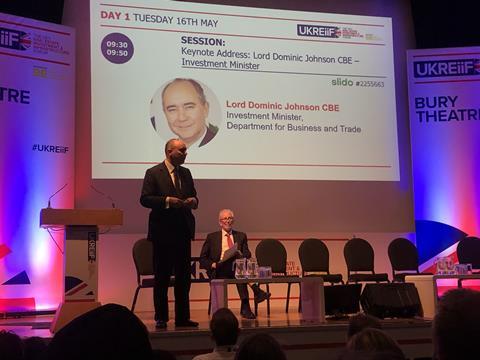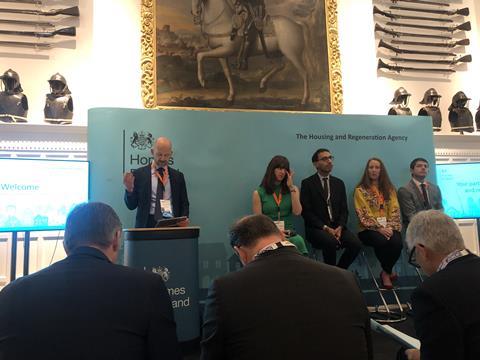The UK’s big new real estate event returned to Leeds for its second outing this year. Daniel Gayne was there to talk to government and industry about trends in development, the year ahead in politics and the future of UKREIIF itself

While the banks of the River Aire might be a touch less glamorous than the Côte d’Azur, the sun still (mostly) shone down on delegates at the second annual UK Real Estate and Infrastructure Investment Forum (UKREIIF). The conference drew even greater numbers on its return to Leeds, with attendees treated to panel discussion on topics as various as devolution, retrofit of heritage buildings and the importance of place-based development.
Here is a summary of some of the big themes that came up:
Frustrations with the current government
Bob Kerslake kicked off the conference with a jab at the government, urging it to reset its relationship with the building industry. The Peabody chair was speaking before visiting investment minister Dominic Johnson and said: “To put it mildly, this has been a difficult time in that relationship, in the aftermath of Grenfell and the need to tackle the safety issue, and some very contested issues around planning and development.
”But we risk seeing housing starts fall to nearly their lowest low since the great financial crash, and we know how desperately we need housing in this country, both market and affordable. So, I would say to the minister, rebuild that relationship – let’s get the country growing and building and developing again.”
This mood of frustration with government was pervasive across the conference, with many who Building spoke feeling that this was an administration that had run out of steam. “The current government has just run out of ideas,” Stephen O’Malley, chief executive of Civic Engineers told Building.
Some fresh ideas and some renewed energy would be welcome
Stephen O’Malley, Civic Engineers
“Some fresh ideas and some renewed energy would be welcome, but the disruption of an election is quite challenging for businesses because investment tends to coast”.
But if there was a general sense that the current government was not long for this world, there was less certainty about the nature of what comes next. In a morning session hosted by politicians-turned-podcasters Alaistair Campbell and Rory Stewart, a quick poll taken by hand was revealing. Asked which party leader they thought would be the next prime minister, the room full of property professionals almost unanimously picked Labour’s Keir Starmer.
They were split roughly evenly when asked whether they thought he would be in coalition or not. But perhaps most significantly, when asked by Stewart if any of them could explain what a Labour government’s economic policy would be, not a hand went up.

Levelling up and place-making
Among the most common themes across panel discussions and conversations across the conference, was the future of the government’s levelling up agenda. Holly Lewis, co-founder of We Made That, an architectural practice which works exclusively with charities and the public sector and which is bidding on levelling up projects, told Building it was too soon to make a judgement, but made some constructive criticisms of the way money has been allocated.
“Spending that kind of money in places has to be good at some level,” she said. “But a proper settlement from government to local areas for them to decide what they want to do with the money seems like a more sensible way of dishing it out”.
If you are not making great places to live and spend time, all the other stuff becomes slightly irrelevant
Holly Lewis, co-founder of We Made That
She said that to truly level up communities, there needed to be investment not just in new buildings, but in the services and amenity spaces that surround them. “For us it has always been what we are interested in, the places where people come together, the public aspect where community happens,” she said.
“Through the pandemic everyone else realised open spaces are important, parks are important, high streets are really important”.
This notion of place-based development was a constant theme across the conference and Lewis said it was “nice to see wider recognition” of it in the industry, adding: “Previously the place making has been seen as the frills that go around the edge. Now if you are not making great places to live and spend time, all the other stuff becomes slightly irrelevant.”
Plans and strategies
The idea of taking a broader view of what makes successful development was reflected in Homes England’s new strategy launch, which revealed its plan to shift away from a “purist” focus on housing towards regeneration, judge on a wider range of metrics including social value. Meanwhile, Birmingham City Council made a major announcement about its own plans to transform its urban environment, with an emphasis on sustainability and active transit. The city’s 20-year framework, developed with consultant Arcadis and architect Glenn Howells, will see much of its concrete infrastructure turned into urban ‘greenways’ alongside a huge increase in population density.

Birmingham was not the only local authority making big moves at UKREIIF. Sheffield Council revealed that it had agreed a development agreement with sustainable developer Citu to forge ahead with planned regeneration of Attercliffe Waterside. The 23-acre scheme will transform brownfield land either side of the Sheffield and Tinsley Canal to create one of the largest zero carbon communities in the UK, featuring more than 1,000 homes.
Meanwhile on the Cinema Stage, Stockport Council and the Mayoral Development Corporation announced that they had selected the English Cities Fund to deliver the next phase of the 130-acre town centre west scheme. The joint venture of Muse, Legal & General and Homes England beat competition from two other partnerships – between Drum Property Group and Graham Investments, and between Glenbrook and Bruntwood – to win the £250m scheme.
UKREIIF to return to Leeds
Much of the talk at UKREIIF was about the event itself. The conference is set to return to Leeds next year, despite bids from other cities. It remains to be seen how much the fledgling conference will grow in the coming years or whether the North Yorkshire city will continue to be able to accommodate it – the Royal Armouries certainly felt rather packed this year.
For many of the contractors and consultants Building spoke to, this was their first year in attendance and were essentially there to get a sense for the event, which they compared positively against MIPIM in the south of France. “It’s MIPIM-esque with a much smaller carbon footprint and a much greater concentration of UK delegates,” said Civic Engineers’ O’Malley.
Others were impressed by the efforts made to ensure there was a gender balance among speakers (although the boys in blue suits still dominated attendees). “I have got to confess, this seems like a nice and very sober event, but I have in the past been to MIPIM,” said Alaistair Campbell at his panel event. Describing the Mediterranean real estate event as “pretty wild”, he added: “I must admit I came away thinking I did come away thinking I didn’t see very much commitment to social justice through the housing and planning system”.
It was telling that while the UK’s public sector presence was dominated by high-level delegations from central government and regional authorities, a whole range of public bodies from small local authorities to quangos and niche government departments showed their faces in Leeds. It seems that for the public sector particularly, UKREIIF has an attractive niche – offering an opportunity to court investment at an event on home ground.


























No comments yet